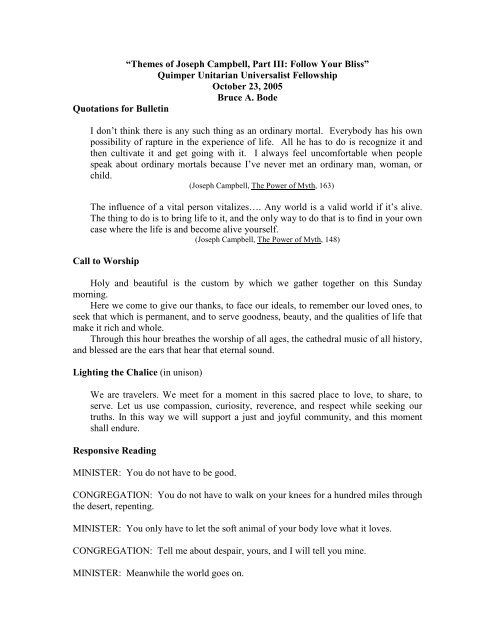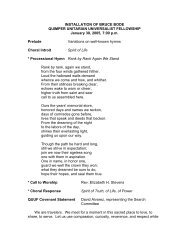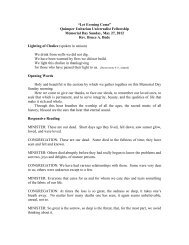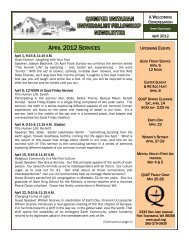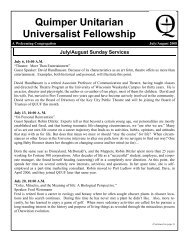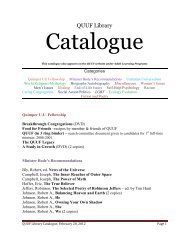Themes of Joseph Campbell - Quimper Unitarian Universalist ...
Themes of Joseph Campbell - Quimper Unitarian Universalist ...
Themes of Joseph Campbell - Quimper Unitarian Universalist ...
You also want an ePaper? Increase the reach of your titles
YUMPU automatically turns print PDFs into web optimized ePapers that Google loves.
“<strong>Themes</strong> <strong>of</strong> <strong>Joseph</strong> <strong>Campbell</strong>, Part III: Follow Your Bliss”<br />
<strong>Quimper</strong> <strong>Unitarian</strong> <strong>Universalist</strong> Fellowship<br />
October 23, 2005<br />
Bruce A. Bode<br />
Quotations for Bulletin<br />
I don’t think there is any such thing as an ordinary mortal. Everybody has his own<br />
possibility <strong>of</strong> rapture in the experience <strong>of</strong> life. All he has to do is recognize it and<br />
then cultivate it and get going with it. I always feel uncomfortable when people<br />
speak about ordinary mortals because I’ve never met an ordinary man, woman, or<br />
child.<br />
(<strong>Joseph</strong> <strong>Campbell</strong>, The Power <strong>of</strong> Myth, 163)<br />
The influence <strong>of</strong> a vital person vitalizes…. Any world is a valid world if it’s alive.<br />
The thing to do is to bring life to it, and the only way to do that is to find in your own<br />
case where the life is and become alive yourself.<br />
(<strong>Joseph</strong> <strong>Campbell</strong>, The Power <strong>of</strong> Myth, 148)<br />
Call to Worship<br />
Holy and beautiful is the custom by which we gather together on this Sunday<br />
morning.<br />
Here we come to give our thanks, to face our ideals, to remember our loved ones, to<br />
seek that which is permanent, and to serve goodness, beauty, and the qualities <strong>of</strong> life that<br />
make it rich and whole.<br />
Through this hour breathes the worship <strong>of</strong> all ages, the cathedral music <strong>of</strong> all history,<br />
and blessed are the ears that hear that eternal sound.<br />
Lighting the Chalice (in unison)<br />
We are travelers. We meet for a moment in this sacred place to love, to share, to<br />
serve. Let us use compassion, curiosity, reverence, and respect while seeking our<br />
truths. In this way we will support a just and joyful community, and this moment<br />
shall endure.<br />
Responsive Reading<br />
MINISTER: You do not have to be good.<br />
CONGREGATION: You do not have to walk on your knees for a hundred miles through<br />
the desert, repenting.<br />
MINISTER: You only have to let the s<strong>of</strong>t animal <strong>of</strong> your body love what it loves.<br />
CONGREGATION: Tell me about despair, yours, and I will tell you mine.<br />
MINISTER: Meanwhile the world goes on.
CONGREGATION: Meanwhile the sun and the clear pebbles <strong>of</strong> rain are moving across<br />
the landscapes,<br />
MINISTER: Over the prairies and the deep trees, the mountains and the rivers.<br />
CONGREGATION: Meanwhile the wild geese, high in the clean blue air, are heading<br />
home again.<br />
MINISTER: Whoever you are, no matter how lonely, the world <strong>of</strong>fers itself to your<br />
imagination,<br />
CONGREGATION: Calls to you like the wild geese, harsh and exciting –<br />
MINISTER: Over and over announcing your place in the family <strong>of</strong> things.<br />
("Wild Geese," Mary Oliver)<br />
A Time for All Ages<br />
The last two weeks I have been reading fairy tales to you from this large book <strong>of</strong> German<br />
fairy tales that were collected by two brothers, Jacob and Wilhelm Grimm. And last<br />
week our story ended with the cat eating the dear, sweet little mouse, which was not a<br />
very happy ending. So let us hope that our fairy tale this morning turns out a little better.<br />
It is titled, “The Donkey.” (The Complete Grimm’s Fairy Tales, pp. 632-635)<br />
Introduction to Reading<br />
My sermon this morning is the third in a four-part series on the life and work <strong>of</strong> <strong>Joseph</strong><br />
<strong>Campbell</strong>, who lived from 1904 to 1987 and was one <strong>of</strong> the finest modern scholars in the<br />
area <strong>of</strong> world mythology and religion. He also achieved something <strong>of</strong> a national and<br />
international recognition, largely through a six-part PBS interview series with Bill<br />
Moyers, first shown in 1988, the year following his death.<br />
His public recognition was due largely, I think, to his willingness to go beyond the<br />
academic realm to speak personally about what he had learned from his studies that could<br />
be applied to living. And probably the most well known <strong>of</strong> his life-applications was the<br />
little three-word phrase, “Follow your bliss,” which has made its way into our everyday<br />
vocabulary, including refrigerator magnets.<br />
In my sermon this morning I will try to unpack what was involved for <strong>Campbell</strong> in this<br />
phrase. And let me begin, as we have the last two weeks, with another reading from<br />
those Moyers’ interviews in which we find <strong>Campbell</strong> commenting on this phrase.<br />
Sheila Lauder will again take the part <strong>of</strong> Bill Moyers and I will read <strong>Campbell</strong>’s part.<br />
<strong>Campbell</strong>’s commentary on this phrase, “Follow your bliss,” comes up in a discussion<br />
about doing battle with dragons, as in the dragon battles <strong>of</strong> the medieval knights.
Reading<br />
MOYERS: How do I slay that dragon in me? What’s the journey each <strong>of</strong> us has to make,<br />
what you call “the soul’s high adventure”?<br />
CAMPBELL: My general formula for my students is “Follow your bliss.” Find where it<br />
is, and don’t be afraid to follow it.<br />
MOYERS: Is it my work or my life?<br />
CAMPBELL: If the work that you’re doing is the work that you chose to do because you<br />
are enjoying it, that’s it. But if you think, “Oh, no! I couldn’t do that!” that’s the dragon<br />
locking you in. “No, no, I couldn’t be a writer” or “No, no, I couldn’t possibly do what<br />
So-and-so is doing.”<br />
MOYERS: In this sense, unlike heroes such as Prometheus or Jesus, we’re not going on<br />
our journey to save the world but to save ourselves.<br />
CAMPBELL: But in doing that, you save the world. The influence <strong>of</strong> a vital person<br />
vitalizes, there’s no doubt about it. The world without spirit is a wasteland. People have<br />
the notion <strong>of</strong> saving the world by shifting things around, changing the rules, and who’s<br />
on top, and so forth. No, no! Any world is a valid world if it’s alive. The thing to do is<br />
to bring life to it, and the only way to do that is to find in your case where the life is and<br />
become alive yourself.<br />
MOYERS: When I take that journey and go down there and slay those dragons, do I have<br />
to go alone?<br />
CAMPBELL: If you have someone who can help you, that’s fine, too. But, ultimately,<br />
the last deed has to be done by oneself. Psychologically, the dragon is one’s own binding<br />
<strong>of</strong> oneself to one’s ego. We’re captured in our own dragon cage. The problem <strong>of</strong> the<br />
psychiatrist is to disintegrate that dragon, break him up, so that you may expand to a<br />
larger field <strong>of</strong> relationships. The ultimate dragon is within you, it is your ego clamping<br />
you down.<br />
MOYERS: What’s my ego?<br />
CAMPBELL: What you think you want, what you will to believe, what you think you<br />
can afford, what you decide to love, what you regard yourself as bound to. It may all be<br />
too small, in which case it will nail you down. And if you simply do what your neighbors<br />
tell you to do, you certainly are going to be nailed down. Your neighbors are then your<br />
dragon as it reflects from within yourself….<br />
MOYERS: I like what you say about the old myth <strong>of</strong> Theseus and Ariadne. Theseus says<br />
to Ariadne, “I’ll love you forever if you can show me a way to come out <strong>of</strong> the<br />
labyrinth.” So she gives him a ball <strong>of</strong> string, which he unwinds as he goes into the
labyrinth, and then follows to find the way out. You say, “All he had was the string.<br />
That’s all you need.”<br />
CAMPBELL: That is all you need – an Ariadne thread.<br />
MOYERS: Sometimes we look for great wealth to save us, a great power to save us, or<br />
great ideas to save us, when all we need is that piece <strong>of</strong> string.<br />
CAMPBELL: That’s not always easy to find. But it’s nice to have someone who can<br />
give you a clue. That’s the teacher’s job, to help you find your Ariadne thread.<br />
MOYERS: Like all heroes, the Buddha doesn’t show you the truth itself, he shows you<br />
the way to the truth.<br />
CAMPBELL: But it’s got to be your way, not his. The Buddha can’t tell you exactly<br />
how to get rid <strong>of</strong> your particular fears, for example. Different teachers may suggest<br />
exercises, but they may not be the ones to work for you. He’s like a lighthouse that says,<br />
“There are rocks over here, steer clear. There is a channel, however, out there.”<br />
The big problem <strong>of</strong> any young person’s life is to have models to suggest possibilities.<br />
Nietzsche says, “Man is the sick animal.” Man is the animal that doesn’t know what to<br />
do with itself. The mind has many possibilities, but we can live no more than one life.<br />
What are we going to do with ourselves? A living myth presents contemporary models.<br />
MOYERS: Today, we have an endless variety <strong>of</strong> models. A lot <strong>of</strong> people end up<br />
choosing many and never knowing who they are.<br />
CAMPBELL: When you choose your vocation, you have actually chosen a model, and it<br />
will fit you in a little while. After middle life, for example, you can pretty well tell what<br />
a person’s pr<strong>of</strong>ession is. Wherever I go, people know I’m a pr<strong>of</strong>essor. I don’t know<br />
what it is that I do, or how I look, but I, too, can tell pr<strong>of</strong>essors from engineers and<br />
merchants. You are shaped by your life.<br />
(<strong>Joseph</strong> <strong>Campbell</strong>, The Power <strong>of</strong> Myth, pp. 149-51)<br />
Meditation<br />
Let us enter into our time <strong>of</strong> silence and meditation with these words from poet William<br />
Stafford:<br />
There’s a thread you follow. It goes among<br />
things that change. But it doesn’t change.<br />
People wonder about what you are pursuing.<br />
You have to explain about the thread.<br />
But it is hard for others to see.<br />
While you hold it you can’t get lost.<br />
Tragedies happen; people get hurt<br />
or die; and you suffer and get old.<br />
Nothing you do can stop time’s unfolding.<br />
You don’t ever let go <strong>of</strong> the thread.<br />
(William Stafford, “The Way It Is”)
“THEMES OF JOSEPH CAMPBELL, PART III: ‘FOLLOW YOUR BLISS’”<br />
The influence <strong>of</strong> the East<br />
<strong>Joseph</strong> <strong>Campbell</strong> was a great student and a great appreciator <strong>of</strong> Eastern religion – <strong>of</strong><br />
Hinduism and Buddhism. He preferred, for example, the Eastern word “Brahman” to the<br />
Western word “God” to refer to the “unimaginable and unnamable Reality” that both<br />
transcends and grounds all existing things, including the categories <strong>of</strong> human cognition.<br />
The Eastern word “Brahman” is a neuter, transpersonal noun, akin to energy, whereas the<br />
Western word “God” tends to be construed as a personal being, akin to human beings,<br />
with primarily “masculine” qualities and characteristics.<br />
<strong>Campbell</strong> also appreciated the Eastern emphasis on this “unimaginable and unnamable<br />
Reality” as being interior to things. In Eastern thought the ultimate mystery <strong>of</strong> being not<br />
only transcends all things, but, more importantly for daily life, is understood to be present<br />
in each thing as its inner essence … so that what you see in the world about you are not<br />
objects from the hand <strong>of</strong> a Creator who stands apart from those objects, but, rather, the<br />
creativity itself in its manifold forms and shapes.<br />
Thus, from the Eastern perspective all things are “divine” in their essential character.<br />
“Divinity” is not so much breathed into things from outside and beyond, but, rather, since<br />
each thing is, as it were, an extrusion <strong>of</strong> the divine mystery, divinity is breathed out from<br />
things, like the fragrance <strong>of</strong> a flower.<br />
Already in the ninth century, B.C.E., Hinduism had discovered the identity <strong>of</strong> the exterior<br />
and the interior, and their formula phrase was, Tat tvam asi” – “You are That.” At the<br />
core <strong>of</strong> your being you are that divine mystery which, heret<strong>of</strong>ore, you may have seen<br />
only as exterior to yourself. Thus, the Hindu prayer greeting to other persons and other<br />
beings: “Namaste” – “I greet the divine in you; I greet the ultimate mystery and power <strong>of</strong><br />
all being in you.”<br />
This experience <strong>of</strong> one’s essential identity with the “Creative Energy” is something that<br />
<strong>Campbell</strong> appreciated in Eastern thought, and the first function <strong>of</strong> mythology and<br />
religion, he liked to say, was simply to open one to the mystery and wonder <strong>of</strong> Being, to<br />
awaken one to the experience <strong>of</strong> being alive and a part <strong>of</strong> that “Creative Power” that<br />
imbues all things. For <strong>Campbell</strong>, religion was first <strong>of</strong> all related to this experience.<br />
And that’s another thing he appreciated about Eastern religion: their emphasis on<br />
experience over belief. In the West, when you consider “religion,” you tend to think in<br />
terms <strong>of</strong> belief, <strong>of</strong> doctrines, <strong>of</strong> creeds and confessions. But in the East, the emphasis is<br />
more on the experience.<br />
In the interviews with Bill Moyers when Moyers said to <strong>Campbell</strong>, “But you’re a man <strong>of</strong><br />
faith,” <strong>Campbell</strong> balked … because it wasn’t faith for him in terms <strong>of</strong> belief. What he<br />
was after had to do with experience, which words, thoughts, and beliefs can only hint at
or point to – the experience <strong>of</strong> awakening to and meeting the “transcendent Mystery” in<br />
the field <strong>of</strong> time and space.<br />
There are yet other ways in which <strong>Campbell</strong> appreciated Eastern religion. For example:<br />
<br />
<br />
<br />
their understanding that there are many paths to this experience, not just one;<br />
their lesser emphasis on institutional religion – religious institutions don’t<br />
hold the “keys to the kingdom,” but are, at best, aids to religious experience,<br />
aids to help you to awaken to what already belongs to you – it doesn’t belong<br />
to the institution.<br />
and, finally, the Eastern understanding <strong>of</strong> symbols and images, namely, that<br />
they are symbols and images … meant to spring the cognitive mind past itself,<br />
to be windows to the experience, or, as <strong>Campbell</strong> says, to be “transparent to<br />
transcendence.”<br />
The influence <strong>of</strong> the West<br />
In all these ways <strong>Campbell</strong> appreciated the Eastern approach to life and religion. Yet, for<br />
all <strong>of</strong> this, <strong>Campbell</strong> was, I would judge, essentially a Western person – not only by<br />
culture and upbringing, but also by inclination and choice. He believed that the West<br />
also had a lot to <strong>of</strong>fer in terms <strong>of</strong> the life <strong>of</strong> the spirit – the West was not just materialistic<br />
in its orientation.<br />
And the core thing that <strong>Campbell</strong> related to in the West was their accent on the unique<br />
individual. The East tends to emphasize the common and universal side <strong>of</strong> things, but in<br />
the West each individual is a unique expression <strong>of</strong> that luminous consciousness and<br />
energy that the East saw shining forth in all things. <strong>Campbell</strong> would agree with Paul<br />
Tillich’s statement, “It’s in the particular that one meets the universal.”<br />
The heart <strong>of</strong> the Western spiritual tradition is identified by <strong>Campbell</strong> in a line from one <strong>of</strong><br />
the Arthurian romances from the thirteenth century, the Queste del Saint Graal, which has<br />
to do with the quest for the Holy Grail, the Grail being the chalice or cup used by the<br />
Christ at the Last Supper, and also the vessel in which the Christ’s blood was received at<br />
the piercing <strong>of</strong> the side on the cross.<br />
The Holy Grail represents wholeness, healing, and fulfillment. And in this Arthurian<br />
romance the Grail appears to the knights <strong>of</strong> the Round Table and then again disappears.<br />
At that point a toast is proposed challenging the knights to go in search <strong>of</strong> the Holy Grail.<br />
And the story’s narrator then adds these words that so gripped <strong>Campbell</strong>:<br />
They thought it would be a disgrace to go forth in a group, so each entered the<br />
forest at a separate point <strong>of</strong> his choice where the forest was darkest and where<br />
there was no way or path.
In other words, each person must find the Grail, the wholeness and blessedness <strong>of</strong> a life,<br />
in his or her own way, taking the route most appropriate to that individual.<br />
This, for <strong>Campbell</strong>, relates to the spiritual gift <strong>of</strong> the West, for, as he says,<br />
…each <strong>of</strong> us is a completely unique creature and, if we are ever to give any gift<br />
to the world, it will have to come out <strong>of</strong> our own experience and the fulfillment<br />
<strong>of</strong> our own potentialities, not someone else’s.<br />
For this reason, the teaching method <strong>of</strong> the traditional Eastern guru did not particularly<br />
appeal to <strong>Campbell</strong> or, at least, he did not think it was the teaching method most<br />
appropriate to the West. The gurus, say <strong>Campbell</strong>, expect a student to become like them.<br />
They know the way; they know where you are on it; and they expect you to end up where<br />
they are.<br />
The traditional Eastern student, says <strong>Campbell</strong>, is “cookie-molded.” The guru gives you<br />
his picture to wear so that you become like him. You don’t question; you don’t critique.<br />
You obey; you imitate.<br />
But that’s no way, says <strong>Campbell</strong>, for a Westerner. In the West, a teacher would give<br />
you your own picture to wear, thus encouraging you to develop your own interests and<br />
aptitudes.<br />
A baseball pitching coach for example, he says, if he’s any good, doesn’t have all the<br />
pitchers throw the same way. He watches to see what’s most “natural” for the individual<br />
players, and then gives clues as to how they might develop their individual talents. (The<br />
Power <strong>of</strong> Myth, p. 143)<br />
And, actually, the best <strong>of</strong> the Eastern teachers recognize this as well … for they<br />
recommend that you stay in your own clothing and retain your own name and culture,<br />
otherwise the force <strong>of</strong> your power is deflected.<br />
Finding your way<br />
So how do you find your path? How do you recognize and bring forth the divine depth<br />
and beauty <strong>of</strong> your own particular particle <strong>of</strong> being?<br />
Well, says <strong>Campbell</strong>, as in the reading earlier in this service, “My general formula for my<br />
students is, ‘Follow your bliss.’”<br />
Where do you feel the deep sense <strong>of</strong> being alive? Where are you most at home, most full<br />
<strong>of</strong> energy, most free, most centered, most real, most related, most happy?<br />
Find out what that is for you and don’t be afraid to follow it … because this is the<br />
creative life-energy stirring within you; this is the mysterious power <strong>of</strong> all being calling to<br />
you. So move toward it, nurture and develop it, and make your contribution to life and to<br />
your society through it.
<strong>Campbell</strong> said he came to this idea <strong>of</strong> bliss through his reading in Hindu scriptures in<br />
which there are three basic terms: sat, chit, and anada. “Sat” means “being;” “chit”<br />
means “consciousness,” and “anada” means “rapture” or “bliss.”<br />
Says <strong>Campbell</strong>, when I studied this, I didn’t know whether my being was proper being,<br />
and I didn’t know whether my consciousness was full consciousness; but I did know<br />
where my rapture was. So I followed my rapture and found that it brought both larger<br />
being and fuller consciousness.<br />
(The Power <strong>of</strong> Myth, p. 120)<br />
But for persons who might not be as clear as <strong>Campbell</strong> was on what or where their<br />
rapture is what clues does <strong>Campbell</strong>, the teacher, <strong>of</strong>fer for discerning one’s bliss?<br />
Again, Bill Moyers in his interviews with <strong>Campbell</strong>, once asked him: “If I’m a young<br />
person and I want to be happy, what do myths tell me about happiness?”<br />
<strong>Campbell</strong> answered:<br />
The way to find out about your happiness is to keep your mind on those<br />
moments when you feel most happy, when you really are happy – not excited,<br />
not just thrilled, but deeply happy. This requires a little bit <strong>of</strong> self-analysis.<br />
What is it that makes you happy? Stay with it, no matter what people tell you.<br />
This is what I call “following your bliss.<br />
(The Power <strong>of</strong> Myth, p. 155)<br />
Thus, <strong>Campbell</strong>’s approach to discerning your bliss is primarily an intuitive one and may<br />
appeal most to those who tend toward an intuitive approach to life. He says:<br />
There’s something inside that knows when you’re in the center, that knows<br />
when you’re on the beam or <strong>of</strong>f the beam. And if you get <strong>of</strong>f the beam just for<br />
the sake <strong>of</strong> earning money, you’ve lost your life. But if you stay in the center,<br />
and even if you don’t get any money, you still have your bliss.<br />
(The Power <strong>of</strong> Myth, p. 229)<br />
The bliss level and its danger<br />
But this “bliss” that <strong>Campbell</strong> is talking about is not always “blissful” in the normal way<br />
<strong>of</strong> speaking and, thus, can be – and, I think, <strong>of</strong>ten has been – misunderstood.<br />
The bliss or rapture that <strong>Campbell</strong> is talking about, as I indicated from its Eastern<br />
connection, comes from a deeper center than the ego. And it isn’t what brings direct<br />
comfort to the ego, and certainly not security. Rather, the ego’s job is pay attention to<br />
this deeper “bliss level” <strong>of</strong> its being and to try to find a way to allow that rapture to come<br />
through in its life without destroying its life …<br />
… because this “bliss dimension” can, indeed, destroy your life, for it is the very power
<strong>of</strong> God, the creative energy <strong>of</strong> all being. It’s like a live cable <strong>of</strong> 10,000-volt electricity,<br />
and if you, in your ordinarily ego-self, grab hold <strong>of</strong> that cable without insulation you’re in<br />
for a world <strong>of</strong> hurt.<br />
I remember <strong>Campbell</strong> saying once, “You’ve gotta keep God from pushing you around too<br />
much. You’ve gotta let God come slowly, or you’ll get blown apart.”<br />
In a certain sense, this energy <strong>of</strong> rapture, this “bliss,” doesn’t care about you in your<br />
human dimension. It’s just fire and wants to burn. And it will burn you up, if you’re not<br />
careful. So you’ve got to protect your life and not let that divine, fiery energy destroy<br />
your earthly being.<br />
Again, says <strong>Campbell</strong>, being God is not being on earth. In the Christian myth, God, in<br />
order to live on earth, had to get crucified. So the thing to do, says <strong>Campbell</strong> laughingly,<br />
is to not quite get crucified.<br />
The example <strong>of</strong> marriage<br />
You can put this dynamic in terms <strong>of</strong> the heart and the head. You follow the heart, but<br />
the head has got to be there all the way.<br />
Let’s take marriage and holy unions as an illustration <strong>of</strong> how the heart and the head are<br />
related. <strong>Campbell</strong> would recommend that you marry, as he did, for love. In other words,<br />
he would recommend that you tap into that electric current, that you connect to the<br />
rapture level <strong>of</strong> your being.<br />
Indeed, this has become the Western ideal. Marriages are no longer arranged as in<br />
traditional cultures for social, political, or economic reasons, or to protect young persons<br />
from making foolish decisions. Rather, the ideal, which continues to spread throughout<br />
the world, is one in which one enters marriage through the doorway <strong>of</strong> love – through the<br />
passageway <strong>of</strong> mutual, personal, and individual attraction.<br />
So marry for love, recommends <strong>Campbell</strong> – and not first <strong>of</strong> all for reasons <strong>of</strong> practicality,<br />
or social standing, or because others think you look good together – but marry for love.<br />
Follow the heart-connection. Let your own heart lead you. Make your life’s journey<br />
with a companion <strong>of</strong> your heart. But in doing so your rational mind needs to be there too.<br />
And you had better know that if and when you decide to take your life’s journey with a<br />
companion <strong>of</strong> your heart that many trials lie ahead on that journey. As the traditional<br />
vow puts it, it’s a journey “for better and for worse.”<br />
<strong>Campbell</strong> even describes marriage as “an ordeal” – not a romantic love affair, which is a<br />
temporary and passing thing, but an ordeal, as in a test or trial. And marriage is an ordeal<br />
because it involves the commitment and surrender <strong>of</strong> each individual ego to the greater<br />
good <strong>of</strong> the larger whole. (And so, perhaps, just because the marriage journey is an<br />
“ordeal,” it is even more important that you take that journey with a companion <strong>of</strong> your<br />
heart.)
At any rate, this is an example <strong>of</strong> what <strong>Campbell</strong> means by following your bliss. And, as<br />
you can see, it certainly doesn’t mean that everything is comfortable or easily digestible,<br />
but, rather, as in the example <strong>of</strong> marriage, it means that whatever happens, that whatever<br />
sorrows <strong>of</strong> the world come your way, you share those sorrows, you go through those<br />
trials, with a companion <strong>of</strong> your heart. And as you have the discipline and courage to do<br />
that, the heart-connection becomes deepened, strengthened, and more nuanced. Thus,<br />
you have your bliss whether or not your life is “blissful” in the ordinary meaning <strong>of</strong> the<br />
word.<br />
A difficult path is this<br />
To follow your bliss, to let your life’s path be determined by your own heart and not<br />
other considerations is, thus, not an easy thing to do. First, you have to quiet the outer<br />
and inner noise to be able to detect the pulse and rhythm <strong>of</strong> your own heart. And,<br />
secondly, you have to have the courage, discipline, savvy, and resistance to greed to find<br />
and maintain your way in the world.<br />
Perhaps this is the narrow way <strong>of</strong> which Jesus speaks in the Gospels – not a path that<br />
separates us from others in pride, but rather a humble path that each <strong>of</strong> us as individuals<br />
is called to traverse, the narrow path <strong>of</strong> discernment and judgment whereby we find a<br />
way in and through the world and within our society, but all the time listening to an inner<br />
voice and obeying an interior call.<br />
Says the Katha Upanishad: “A sharpened edge <strong>of</strong> a razor, hard to traverse,/A difficult<br />
path is this – poets declare!”<br />
In other words, following the bliss path is a journey to be undertaken as carefully and as<br />
delicately as walking a razor’s edge. Or, in another analogy <strong>Campbell</strong> uses, it’s like<br />
crossing a sword-bridge. In both cases, the blades are understood to be upright, not flat.<br />
That’s how carefully and delicately this path is to be taken.<br />
And it’s so easy to lose your balance … because if, on the one hand, you just follow the<br />
energy or rapture <strong>of</strong> your soul, paying no attention to the structures and conventions <strong>of</strong><br />
society or the necessities <strong>of</strong> putting a life together, then you are blown <strong>of</strong>f the left side <strong>of</strong><br />
that sword-bridge, destroying your body, neglecting your human dimension.<br />
If, on the other hand, you only follow the conventions and expectations <strong>of</strong> society and the<br />
practicalities <strong>of</strong> putting a life together, then you will tilt to the right and fall <strong>of</strong>f the bridge<br />
to that side, having lost your very soul, having disconnected from your interior, divine<br />
source <strong>of</strong> energy.<br />
So when you make this journey <strong>of</strong> the heart you need to know – and you will soon<br />
enough discover – that you don’t have to deviate very far from the conventions <strong>of</strong> your<br />
social group to run yourself into real trouble. It doesn’t take much to find yourself on the<br />
outside looking in.
Nevertheless, society ought not to be thought <strong>of</strong> as the ultimate enemy <strong>of</strong> the individual,<br />
for society, which is the composite <strong>of</strong> all <strong>of</strong> us together, is not something apart from us;<br />
rather, it’s the field in which the energy <strong>of</strong> the individual is brought into play.<br />
Society provides and fashions different roles for us to play and different masks for us to<br />
wear – I’ll speak more about this next week on “Halloween Sunday” – roles and masks<br />
that receive our energy and, which hopefully, we can make our own.<br />
There is no individual without the group. And, thus, the individual has an obligation to<br />
support the group, the community. And, for <strong>Campbell</strong>, the way that he recommends for<br />
supporting your society – which has now become a “planetary society” – is,<br />
paradoxically, by following your individual bliss.<br />
Find and follow the thing that you love, and then try to find a way to bring that love to<br />
your community. Thus, he says, “The influence <strong>of</strong> a vital person vitalizes.” That’s what<br />
brings life to the world.<br />
A final theme<br />
One final idea relating to this theme <strong>of</strong> following your bliss, a little “superstition” that<br />
<strong>Campbell</strong> said he developed over the years, was the idea that if you follow your bliss, if<br />
you heed the rapture <strong>of</strong> your soul, then doors will open for you, paths will present<br />
themselves to you in the dark forest <strong>of</strong> a life. These are doors and paths where there<br />
didn’t appear to be any before. And they are doors and paths that open just for you and<br />
for no one else. They are your doors; they belong to you and not to others. When such a<br />
door opens for you go through it. Don’t hesitate and don’t apologize but make the most<br />
<strong>of</strong> it, both for yourself and for others.<br />
<strong>Campbell</strong> believed that if you were on your path and made the effort to stick to that path,<br />
then you would find surprising supports for your journey. Mythologically speaking, little<br />
elves, gnomes, and fairy godmothers would accompany you. This idea was a personal<br />
conviction that grew for <strong>Campbell</strong> with the passing years and was based on the<br />
experience <strong>of</strong> the way that he tried to live his own life.<br />
Even from early life <strong>Campbell</strong> refused to get pulled <strong>of</strong>f his track, which was the study<br />
and enjoyment <strong>of</strong> mythology. Fortunately, his parents supported and encouraged him in<br />
this, providing him with the kind <strong>of</strong> literature he needed when he took an early interest in<br />
Native American stories and myths. Nor did his father protest when his son did not<br />
follow him into the family business, though <strong>Campbell</strong> tried that route for a brief time.<br />
But <strong>Campbell</strong> showed tremendous resolve in not being pulled <strong>of</strong>f his track or distracted<br />
from it. For example, he simply dumped his Ph. D program at Columbia when it proved<br />
too confining, going <strong>of</strong>f instead to read for five years in the woods in upstate New York<br />
at Woodstock – this was during the Great Depression – renting, with money he had saved<br />
playing saxophone in a band, a little chicken-coop-like cabin for $20 a year – no running
water, just a well and a pump. (The owner wouldn’t install running water, he said,<br />
because he didn’t like the class <strong>of</strong> people it attracted.) (The Power <strong>of</strong> Myth, p. 120)<br />
Some years later <strong>Campbell</strong> was <strong>of</strong>fered a teaching job at Sarah Lawrence College, at that<br />
time an all women’s college located in Bronxville, a small town about twenty miles north<br />
<strong>of</strong> New York City. There he met and later married a woman who shared his artistic<br />
interests, Jean Erdman, destined to become a well-known dancer with the Martha Graham<br />
Dance Company. Together they lived for forty some years in a modest apartment in New<br />
York City, each working in their individual fields and collaborating as well. The<br />
bedroom <strong>of</strong> their apartment served as <strong>Campbell</strong>’s study; their living room couch folded<br />
out into their bed.<br />
And following the impulse <strong>of</strong> his interest and energy, the path opened and opened and<br />
opened before him. When I met him in his late 70’s he was still following the trail <strong>of</strong> his<br />
interest and loved nothing more than to share that interest. He was about as engaging a<br />
person as you would ever wish to meet, a combination <strong>of</strong> both courtesy and<br />
combativeness.<br />
At one point in those marvelous Moyers’ interviews, Bill Moyers asked him, “Do you<br />
ever have this sense when you are following your bliss … <strong>of</strong> being helped by hidden<br />
hands?” <strong>Campbell</strong> replied:<br />
Benediction<br />
All the time. It is miraculous. I even have a superstition that has grown on me<br />
as a result <strong>of</strong> invisible hands coming all the time – namely, that if you do follow<br />
your bliss you put yourself on a kind <strong>of</strong> track that has been there all the while,<br />
waiting for you, and the life that you ought to be living is the one you are living.<br />
When you can see that, you begin to meet people who are in your field <strong>of</strong> bliss,<br />
and they open doors to you. I say, follow your bliss and don’t be afraid, and<br />
doors will open where you didn’t know they were going to be.<br />
(The Power <strong>of</strong> Myth, p. 120)<br />
Now may peace be in our hearts,<br />
and understanding in our minds,<br />
may courage steel our wills,<br />
and the love <strong>of</strong> truth forever guide us. Amen.<br />
Extinguishing <strong>of</strong> Chalice<br />
We extinguish this chalice<br />
But not the light <strong>of</strong> truth,<br />
The warmth <strong>of</strong> community,<br />
Or the fire <strong>of</strong> commitment.<br />
These we carry in our hearts<br />
Until we are together again.
(NOTE: This is a manuscript version <strong>of</strong> the sermon preached by The Reverend Bruce A.<br />
Bode on October 23, 2005. This sermon is the third in what is planned as a four-part<br />
series. The spoken sermon, available on audio cassette at the Fellowship, may differ<br />
somewhat in phrasing and detail from this manuscript version.)


